In a class of 30 children, no two learn the same way and a teacher does not have time to instruct them all differently. But artificial intelligence does – and across the East of England it is being used to modernise and personalise education. The aim is to ensure no child gets left behind and that learning is engaging, but how can teachers ensure the technology is not abused?
In a hangar at West Suffolk College in Bury St Edmunds lies an XR Virtual Reality Lab.
This £2m futuristic-looking pod, built using government funding, uses AI to create virtual 3D worlds that students can access through headsets or tablets, immersing them in their subjects. It also “gamifies” the curriculum to engage students.
It is the pride and joy of Nikos Savvas, the chief executive of the Eastern Education Group which operates several colleges in the region.
He says: “We teach in an antiquated way which only works for the minority. We need to move out of the Victorian ages. Why can’t learning be fun?”
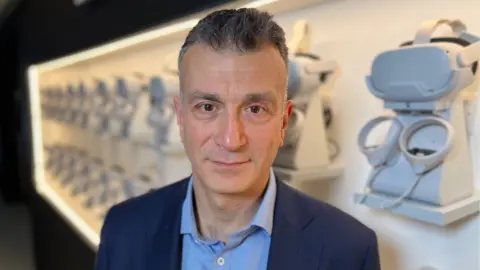
Nikos Savvas believes AI can keep students engaged in education for longer by taking teaching “out of the Victorian ages”
Mr Savvas believes most people learn best through experience.
“We tested this with primary school children. They were taught traditionally about ancient Egypt and then asked to write about it.
“Next, they were given a headset which allowed them to walk through the pyramids in a virtual world. You should have heard their shrieks of joy.
“When they wrote about Egypt for a second time, the difference was incredible.”
 Eastern Education GroupEngineering students work together in a virtual world to practise practical tasks
Eastern Education GroupEngineering students work together in a virtual world to practise practical tasks
The technology is used for many courses. For example, engineering students can meet in a virtual room and work together to build a plane engine.
Tom Lloyd, who runs the lab, says “it gives them confidence and experience before working with real parts, which are expensive and can be difficult to access”.

Tom Lloyd says students gain confidence and experience through virtual reality
But is there a danger that students, who already live in a screen-reliant society, will be over-stimulated by yet more gamification? Mr Savvas believes that done properly, the answer is ‘no’.
“We ensure there is a balance between classroom, outdoor and virtual learning. That protects mental health,” he says.
Few places in the country have facilities like this and Mr Savvas hopes the trials he is running allows others to follow.
But AI does not have to be this costly to bring benefits.
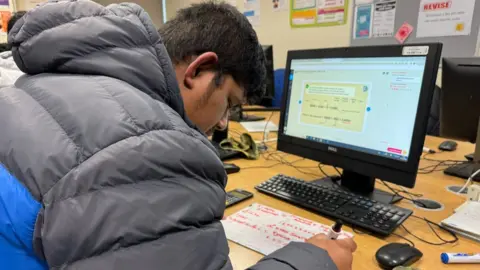
GCSE students at Bedford College use the Century Tech AI programme to personalise their learning
The Bedford College Group uses AI across its sites in Bedfordshire and Northamptonshire to help GCSE Maths and English students.
On computers they work through a series of modules set by the teacher. The AI analyses how they answer questions, flagging up areas they struggle with and personalising the learning by giving them more practice.
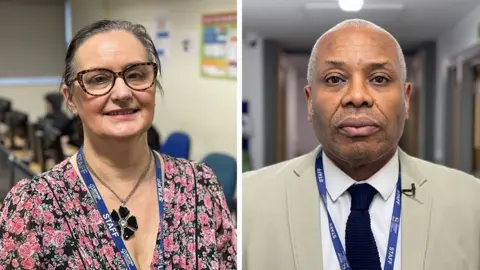
Teachers Sara Pryce and Richard Rochester use AI help students improve their weaknesses
Sara Pryce says teachers, like her, are still “central to the process but students don’t have to wait for me to mark their work, they know instantly if they’re on track and they can work at their own pace”.
For English teacher Richard Rochester it provides an “invaluable and instant understanding of the strengths and weaknesses of new students”, so no time is lost.
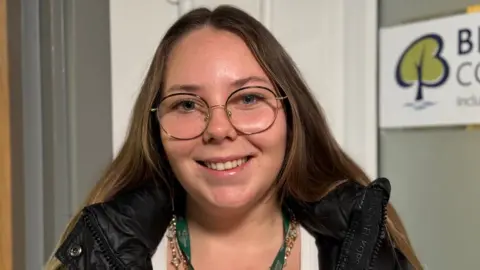
Bedford College student Alexandra Balogh, 18, says AI helped her to build confidence with her English lessons and achieve higher grades
Student Alexandra Balogh, 18, says: “I love it. At the beginning my grammar was really bad, but now I have confidence in class and in my assignments. It’s made me realise what I’m capable of.”
Mahidur Chowdhury, 18, also praises the programme. “I’m using it to practise compound interest. It’s good because you can keep trying it until it gets into your head,” he says.
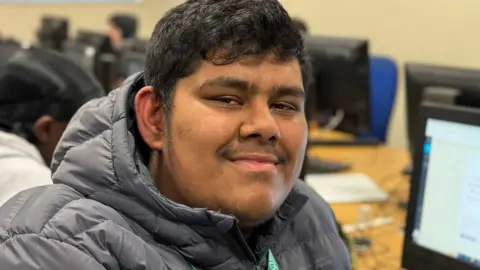
Mahidur Chowdhury, 18, says AI helps him understand homework questions when a teacher is not there
The AI programme is used mainly for homework and the vice principal, Nina Sharp, says it is delivering results.
“Grades for students who’d used Century Tech were 5% higher for maths and 10% higher for English,” she says.
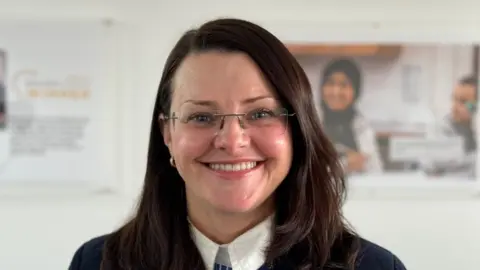
Bedford College vice principal, Nina Sharp, says AI is helping her GCSE students achieve better grades
Increasingly, staff also use AI to produce lesson plans.
Ben Lewis, course director for e-sports at West Suffolk College, says most teachers plan lessons in their own time.
“It can take hours and adds to an already heavy workload. AI programmes can plan a lesson in minutes,” he says.
“We have to check it and tweak it, but that takes far less time than planning from scratch.”

Ben Lewis, course director for e-sports, says students must be taught to use AI responsibly as a research tool
But teachers understand this technology can be abused. Some students ask AI to write entire essays for them.
“Students must be taught to use AI responsibly,” Mr Lewis says. “I say to them, ‘Use it, like you’d use me.’ ‘Ask it questions for research, but don’t expect it to do the work for you.'”
The college is setting up an AI Board, which will review the work of anyone thought to have taken unreasonable advantage of the technology.
Students will have to present their knowledge of the subject to staff to ensure they understand it. Across the region, teachers feel this process will become more common.
Teachers accept that artificial intelligence is here to stay. The challenge is how to harness its potential while avoiding the pitfalls.
The Department for Education is still investigating how AI will change learning and teaching in order to develop a future policy.
Education Secretary Gillian Keegan said: “It’s crucial we get our approach to it right.
“It’s heartening that many education professionals are already seeing the tangible benefits of AI while remaining alert to its risks.”














50 comments
I was examining some of your articles on this website and I think this website is real instructive!
Keep on posting.Raise blog range
I got what you mean , appreciate it for putting up.Woh I am delighted to find this website through google. “The test and use of a man’s education is that he finds pleasure in the exercise of his mind.” by Carl Barzun.
Hey there! I know this is kinda off topic however I’d figured I’d ask. Would you be interested in trading links or maybe guest authoring a blog post or vice-versa? My site discusses a lot of the same subjects as yours and I think we could greatly benefit from each other. If you happen to be interested feel free to send me an e-mail. I look forward to hearing from you! Great blog by the way!
I went over this internet site and I believe you have a lot of good info, bookmarked (:.
Nice post. I study something more challenging on completely different blogs everyday. It is going to all the time be stimulating to learn content from other writers and follow somewhat something from their store. I’d desire to use some with the content material on my weblog whether you don’t mind. Natually I’ll provide you with a hyperlink on your internet blog. Thanks for sharing.
After I originally commented I clicked the -Notify me when new feedback are added- checkbox and now each time a comment is added I get 4 emails with the identical comment. Is there any method you possibly can remove me from that service? Thanks!
Wow, awesome blog layout! How long have you been blogging for? you made blogging look easy. The overall look of your web site is magnificent, as well as the content!
he blog was how do i say it… relevant, finally something that helped me. Thanks
Great write-up, I am regular visitor of one¦s blog, maintain up the excellent operate, and It is going to be a regular visitor for a lengthy time.
Thanks for your whole efforts on this blog. My niece takes pleasure in making time for investigations and it is easy to see why. Many of us hear all concerning the powerful method you convey sensible items via your web blog and even recommend participation from website visitors on this topic then our own child is learning a whole lot. Enjoy the rest of the year. You’re the one doing a remarkable job.
order cheap clomiphene price cost of clomid for men order generic clomiphene without a prescription where can i buy generic clomid without dr prescription how can i get generic clomiphene pill can i get clomid without insurance cost cheap clomid pills
Greetings! Very serviceable advice within this article! It’s the scarcely changes which wish obtain the largest changes. Thanks a a quantity in the direction of sharing!
The sagacity in this piece is exceptional.
buy zithromax 250mg for sale – buy floxin paypal flagyl without prescription
buy semaglutide sale – purchase periactin generic cyproheptadine for sale online
buy motilium – motilium price cyclobenzaprine buy online
propranolol pills – buy propranolol without a prescription buy methotrexate 5mg pills
amoxil pill – buy amoxicillin online brand ipratropium
buy zithromax for sale – buy generic zithromax for sale buy nebivolol 5mg online cheap
buy augmentin pills for sale – https://atbioinfo.com/ ampicillin for sale
buy esomeprazole online – https://anexamate.com/ order nexium 20mg pills
buy cheap medex – anticoagulant losartan buy online
purchase meloxicam sale – mobo sin buy meloxicam 15mg generic
As soon as I noticed this website I went on reddit to share some of the love with them.
cheap prednisone 10mg – https://apreplson.com/ prednisone 20mg uk
can you buy ed pills online – https://fastedtotake.com/ buy ed pills generic
cheap amoxicillin online – combamoxi.com cheap amoxicillin for sale
brand forcan – flucoan purchase fluconazole generic
cenforce 50mg pills – https://cenforcers.com/ cenforce 100mg generic
cialis 20 mg how long does it take to work – https://ciltadgn.com/# most recommended online pharmacies cialis
over the counter cialis walgreens – strong tadafl cialis for daily use dosage
buy zantac cheap – on this site buy zantac sale
cheap viagra in london – https://strongvpls.com/ viagra buy sri lanka
Thanks towards putting this up. It’s okay done. online
Thanks recompense sharing. It’s top quality. amoxicillin order online
Thanks for putting this up. It’s okay done. https://prohnrg.com/product/rosuvastatin-for-sale/
The thoroughness in this section is noteworthy. https://aranitidine.com/fr/acheter-fildena/
Thanks for putting this up. It’s well done. https://ondactone.com/simvastatin/
Absolutely written content, Really enjoyed looking at.
Facts blog you be undergoing here.. It’s intricate to find elevated quality article like yours these days. I really respect individuals like you! Go through vigilance!!
https://proisotrepl.com/product/cyclobenzaprine/
More peace pieces like this would make the интернет better. https://lzdsxxb.com/home.php?mod=space&uid=5057521
I’m really inspired along with your writing talents as well as with the structure for your blog. Is that this a paid theme or did you customize it yourself? Either way stay up the excellent high quality writing, it’s rare to peer a great weblog like this one today..
Hello! I just would like to give a huge thumbs up for the great info you have here on this post. I will be coming back to your blog for more soon.
You can certainly see your enthusiasm within the paintings you write. The arena hopes for even more passionate writers like you who aren’t afraid to mention how they believe. At all times go after your heart. “The most profound joy has more of gravity than of gaiety in it.” by Michel de Montaigne.
buy forxiga 10mg sale – https://janozin.com/# forxiga 10 mg pill
hello there and thank you for your info – I’ve definitely picked up something new from right here. I did however expertise several technical issues using this web site, as I experienced to reload the web site a lot of times previous to I could get it to load correctly. I had been wondering if your web hosting is OK? Not that I am complaining, but sluggish loading instances times will very frequently affect your placement in google and could damage your high quality score if ads and marketing with Adwords. Well I am adding this RSS to my e-mail and could look out for much more of your respective intriguing content. Ensure that you update this again soon..
orlistat order online – https://asacostat.com/ xenical drug
This is the gentle of scribble literary works I rightly appreciate. https://www.forum-joyingauto.com/member.php?action=profile&uid=49494
Thank you for sharing with us, I think this website really stands out : D.
I like this site its a master peace ! Glad I found this on google .